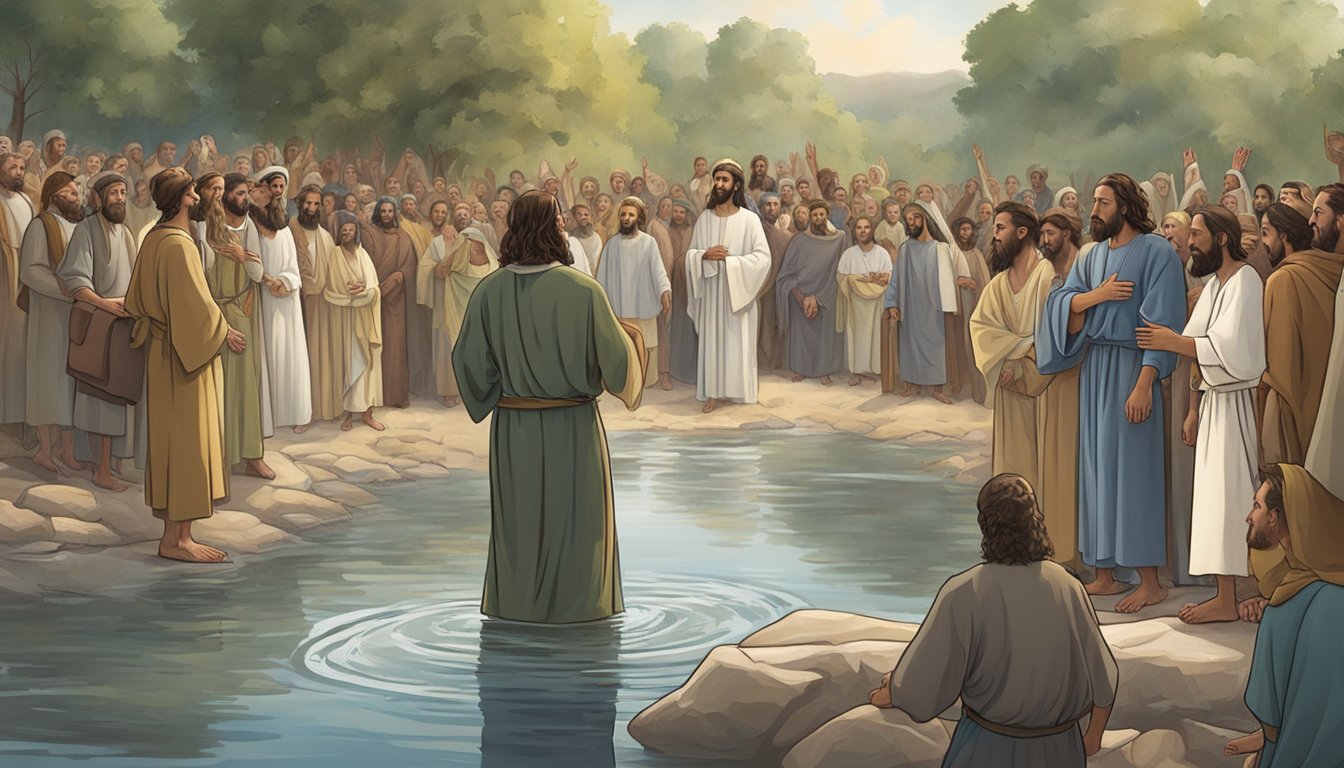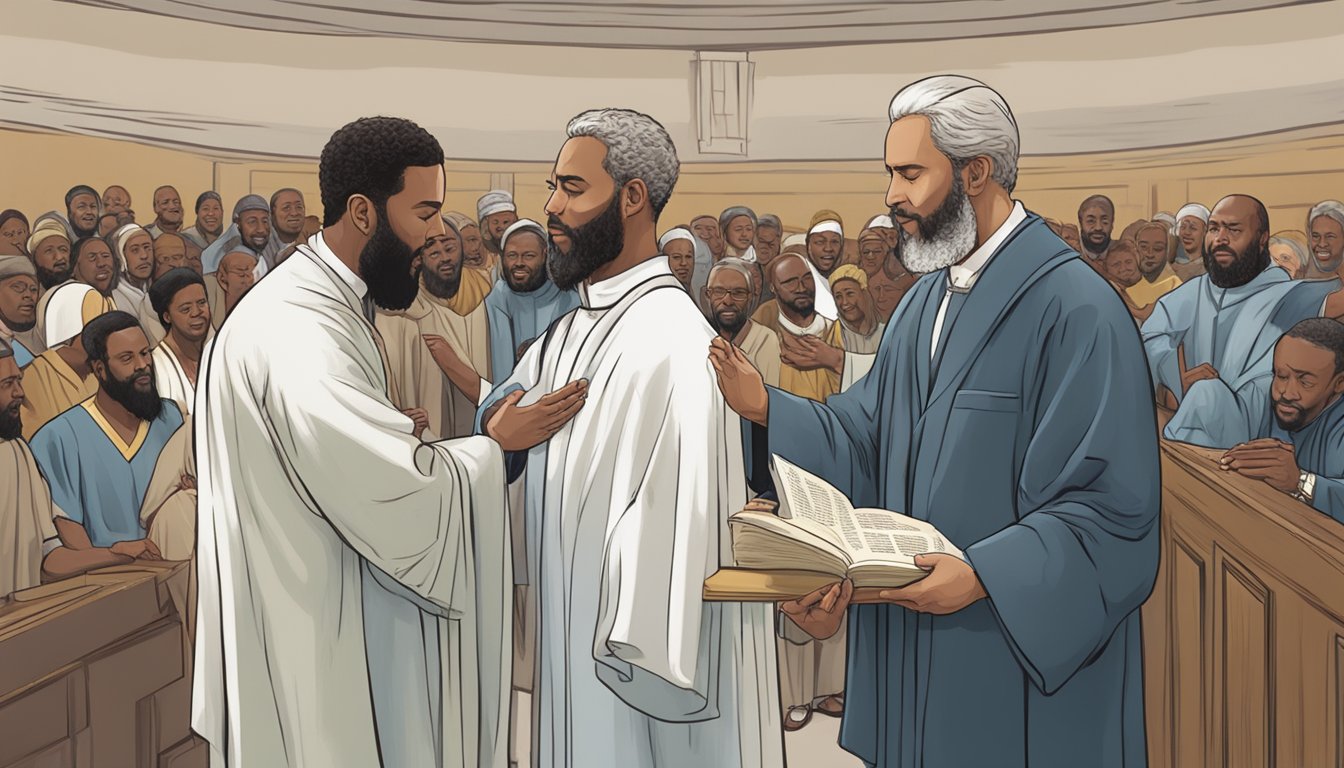Understanding the nuances between Christian denominations can sometimes be a complex task due to the wide variety of practices and beliefs within the Christian faith. The term ‘Christian’ refers broadly to followers of Jesus Christ and includes numerous groups with diverse theological perspectives. Baptists, on the other hand, constitute a specific subset within the wider Christian tradition. They are known for their unique stance on baptism and other distinct doctrinal views.

Christian vs Baptist

The main distinguishing feature of Baptists is their practice of believer’s baptism, which asserts that baptism should be performed only on those who profess a personal faith in Jesus Christ. This differs from some other Christian denominations that practice infant baptism. Moreover, Baptist churches are characterized by their emphasis on the supremacy of the Bible as the sole authority in matters of faith and conduct, and the autonomy of the local congregation in its governance.
Key Takeaways
- Baptists represent a distinct group within Christianity, marked by their practice of believer’s baptism.
- Baptists adhere to the principle of ‘sola scriptura’, valuing the Bible as the ultimate authority.
- Autonomy of the local church is a key aspect of Baptist church governance and organization.
Historical Context

Understanding the distinctions between Baptists and other Christian denominations necessitates an exploration of their roots and historical evolution. This involves their origins, involvement in pivotal religious movements, and influence on religious liberty.
Origins and Early Development

Baptists trace their origins back to the early 17th century within English-speaking Protestantism. Initially, John Smyth, an English separatist, led a congregation that sought to practice a more purified form of Christianity. They believed in the concept of believers’ baptism, where baptism is reserved for those who consciously confess their faith in Jesus Christ. This practice was a shift away from infant baptism, which was prevalent among other denominations.
The First Baptist Church in America was established by Roger Williams in Providence, Rhode Island, in 1638. Williams, a staunch advocate for religious freedom, disagreed with the Puritan Church’s intermixing with state affairs. His settlement in Rhode Island became a haven for religious dissenters and a landmark in the history of American Baptists.
Role in the Protestant Reformation
Although the Baptist movement emerged after the initial wave of the Protestant Reformation, it was part of the broader Reformation era that sought to restore the church’s adherence to scriptural purity. Baptists participated in this movement by advocating for a church that embraced a congregational form of governance, allowing each individual church to self-govern without the hierarchy of bishops or other ecclesiastical authorities. This aligns with a key principle of the Reformation: the priesthood of all believers, which stipulates that all Christians have direct access to God and his Word.
Core Beliefs and Theology
This section outlines the distinctive beliefs and theological standpoints that differentiate Baptist traditions from other Christian denominations, with a focus on salvation, biblical interpretation, and the understanding of the divine nature within the context of the Trinity.
Understanding of Salvation
Baptists firmly believe in salvation through faith alone; they assert that one must consciously accept Jesus Christ as Lord and Savior to receive eternal life. This contrasts with some Christian denominations that may include baptism or sacraments as a necessity for salvation. Baptists emphasize personal conversion and believer’s baptism—the practice of baptizing individuals who profess their faith, typically through full immersion in water.
Biblical Authority and Interpretation
Baptists generally adhere to biblical literalism or the belief that the Bible is the literal Word of God. They maintain that the scriptures are the final authority in matters of faith and conduct. While many other Christian branches also honor the Bible as the cornerstone of their faith, they may diverge in their approach to hermeneutics, with some applying more allegorical or metaphorical interpretations to the scriptures.
Nature of God and Trinity
Baptists share with most other Christian denominations the core doctrine of the Trinity, professing God as one essence in three persons: Father, Son, and Holy Spirit. Nevertheless, how they experience and relate to this triune God may differ due to variations in worship style, liturgy, and church governance. The core belief in the Trinity encapsulates the complexity of the divine nature and underscores the unity of the traditional Christian faith across different denominations, including Baptist churches.
Rituals and Practices

Rituals and practices are at the heart of distinguishing Baptists from other Christian denominations. They center on the observance of baptism and communion, which are performed with unique significance and methods reflective of Baptist beliefs.
Baptism and Its Significance
Baptism is a cornerstone of faith that symbolizes the believer’s faith in Jesus Christ.
- Baptists typically adhere to believer’s baptism by immersion, where the individual is fully submerged in water. This signifies the believer’s death to sin and rebirth in Christ’s righteousness.
- Unlike some denominations that practice infant baptism, Baptists believe baptism should follow an individual’s personal confession of faith.
- Immersion: The chosen method for its symbolic resemblance to burial and resurrection.
- Believer’s Baptism: A declaration of faith, affirming personal belief.
Communion Observances
Communion serves as a sacred act of remembrance.
- Baptists hold communion as an ordinance rather than a sacrament, portraying it as a symbolic act rather than a means of grace.
- The practice is often referred to as the Lord’s Supper and is observed with bread and wine (or grape juice), representing Christ’s body and blood.
- Observance Frequency: Varies among churches; some monthly, others less frequently.
- Open/Closed Communion: Open to all believers in some Baptist churches, closed to only members in others.
Church Organization and Governance

In exploring the distinctions between Christian churches overall and Baptist churches specifically, one will notice variance in church organization and governance. These differences become evident in the leadership structures and the level of autonomy bestowed upon individual congregations.
Leadership Structure
Christian denominations can display a variety of leadership structures, often shaped by theological beliefs and historical developments. For instance, an Episcopal system—as seen in the Anglican, Catholic, and some Methodist churches—features a hierarchical structure with bishops overseeing multiple congregations. In contrast, Baptists typically emphasize ordination as a local church matter and generally eschew formal hierarchies. This means that each Baptist church typically appoints its own leaders, such as pastors and deacons, who are accountable directly to the congregation.
Autonomy and Congregational Governance
The notion of autonomy stands as a hallmark of Baptist church governance. Unlike denominations with a more centralized authority, Baptists uphold the principle of congregational governance, which asserts that the ultimate authority in a church resides within the local congregation itself. Each Baptist congregation makes its own decisions regarding budgets, programs, and leadership appointments, reflecting a democratic process that is still under the guidance of Christ’s lordship. This autonomy allows Baptist churches to tailor their ministries and practices to best meet the needs of their community, whilst still aligning with the wider Baptist beliefs.
Denominational Differences
When exploring the varied landscape of Christianity, understanding the nuances between Baptist beliefs and other Christian denominations can offer insightful contrasts and highlight the rich tapestry of Christian faith traditions.
Baptist versus Other Christian Denominations
The Baptist movement is known for its distinctive practice of believer’s baptism by immersion. This contrasts with denominations like the Presbyterian, Roman Catholic, and Lutheran churches, which practice infant baptism. Baptist churches uphold the authority of the Bible as their supreme guide for faith and practice, challenging the tradition of papal authority seen in the Roman Catholic denomination. In terms of governance, Baptist churches emphasize local church autonomy, differing from the hierarchical structures found in many other Christian denominations such as the Methodist church or the Southern Baptist Convention, which, while not hierarchical like the previously mentioned denominations, operates a cooperative program among its congregations.
Variety within Baptist Churches
The Baptist Church itself is not a monolithic entity, as it includes a range of denominations with differing beliefs and practices. For instance, the Southern Baptist Convention is known for its more conservative stance on theological and social issues, while the American Baptist Churches USA, often seen as more progressive. Despite the variations, Baptist beliefs generally coalesce around the principles of baptism for believers, the priesthood of all believers, and congregational governance.
Worship and Community Life
« Are Church Finances Public Information?
The Difference Between Christianity and Jehovah’s Witnesses: Key Beliefs Explained »
In exploring the varied practices between Baptists and the wider Christian community, one finds distinct approaches to worship services, the role of music, and community engagement.
Church Services and Sermons
Baptist churches prioritize the preaching of the Bible, often with sermons that are rooted in scriptural analysis and personal application. They believe in the authority of the Bible and typically focus on individual interpretation under the guidance of the Holy Spirit. In contrast, a Christian church may integrate more structured liturgical elements into their services, including set prayers and readings that follow a liturgical calendar.
Role of Music and Hymns
Music and hymns play a vital role in both Baptist and broader Christian worship services, although the styles may differ. Baptists usually embrace a mixture of contemporary music and traditional hymns that allow for personal reflection and corporate worship. The wider Christian community, especially in more liturgical traditions, may place a stronger emphasis on the use of traditional hymns and choirs to enhance the worship experience.
Community Engagement and Evangelism
Community engagement and evangelism are hallmarks of both Baptist and Christian traditions. Baptists often stress the importance of personal evangelism, encouraging believers to share their faith individually. The broader Christian community may engage in evangelism through a variety of programs and initiatives, from local service projects to global missions, all aimed at spreading the gospel and offering support to those in need.
Sacraments and Ordinances

In Christianity, practices such as sacraments and ordinances are vital expressions of faith and obedience. They are distinguished mainly by the significance and theology attributed to them by different Christian denominations.
Distinguishing Believer’s Baptism
Believer’s Baptism is a distinctive practice among Baptists, marking it as an ordinance rather than a sacrament. This rite emphasizes the individual’s personal faith decision, requiring one to be of an age to consciously decide to follow Christ before undergoing immersion in water. The act of baptism represents a public profession of faith, signifying a spiritual cleansing and new life in Christ.
Understanding the Lord’s Supper
The Lord’s Supper, also commonly referred to as Eucharist or Communion, varies in interpretation between being an ordinance and a sacrament. Mainstream Christian traditions hold it as a sacrament, imbued with spiritual grace, where symbolic elements represent the body and blood of Christ. In contrast, other denominations, like many Baptist churches, view it as a commemorative ordinance—remembering Christ’s sacrifice without the sacramental aspect of conveying grace.
Social and Political Stance
In examining the social and political stance within Christian denominations, particularly Baptists, there are discernible positions on the separation of church and state and the value placed on religious freedom and autonomy.
Separation of Church and State
Baptists traditionally advocate for a clear separation of church and state, maintaining that government should not interfere with the practices of the church. This viewpoint can be illustrated by members of certain evangelical churches, such as the Southern Baptist Convention, who tend to favor political parties that support their view of religious independence from government oversight. According to Pew Research Center, these members often align with the Republican party, valuing policies that uphold their vision of autonomy.
Religious Freedom and Autonomy

For Baptists, religious freedom is a cornerstone belief, affirming the right to worship free from governmental intrusion. The principle of autonomy extends to the governance of their local congregations—each Baptist church is self-governing and makes its own decisions. Progressive Baptists, on the other hand, approach theology and social issues with an open mind, sometimes diverging from traditional stances and reflecting a spectrum of beliefs within the broader Baptist and Christian communities.
Personal Commitment and Discipleship
When exploring the journey of faith within Christianity, personal commitment and discipleship stand as keystones. They embody the transformation and ongoing process that believers undertake to live a life reflective of their faith and values.
Conversion and Commitment
Conversion marks the beginning of a personal journey of faith, where an individual accepts the teachings of Jesus Christ and makes a conscious decision to follow Him. It’s a pivotal moment that involves both a recognition of one’s need for atonement and an embrace of the faith that leads to a significant personal commitment. This commitment manifests in daily life through actions and choices that align with Christian teachings.
Key Differences in Christian Denominations:
- Baptists: Typically emphasize a personal decision to accept Christ, often marked by believer’s baptism.
- Other Denominations: May include infant baptism or a focus on confirmational instruction at an older age.
Role of Disciples and Missionary Work
Discipleship extends beyond the initial act of conversion, calling for a lifetime of learning, growth, and active engagement in the community. Ministers and lay believers alike are encouraged to engage in missionary work, which often involves evangelism and teaching, sharing their faith with the aim of guiding others toward conversion and a deeper understanding of Christian principles.

Missionary Work Across Christian Traditions:
- Evangelism: Sharing the gospel is central, with methods varying from personal relationships to large-scale events and media outreach.
- Discipleship Training:
- Mentoring: More experienced believers mentor newer ones, guiding them in spiritual growth.
- Educational Programs: Many churches offer structured programs to educate and foster discipleship.
In their continued discipleship, Christians are often involved in various forms of service, reflecting Jesus’ call to minister to others both spiritually and physically. Regardless of the denomination, the essence of missionary work and discipleship in Christianity is to live out and spread the faith they profess, turning belief into action.
Comparison of Baptist and Christian Practices
In exploring the various expressions of Christian faith, it’s essential to understand the nuances between denominations like the Baptist churches and the broader Christian church, especially in terms of practices and sacraments, and their unique approaches to scripture and leadership.
Church Services and Sacraments
Baptist worship services often focus on the preaching of the Bible, valuing sermons that expound clearly on scriptural teachings. They typically include a mix of hymns and modern worship music, prayer, and sometimes testimonials by members of the congregation. One of the defining Baptist beliefs is the practice of believer’s baptism by immersion—this sacrament signifies the believer’s faith in Jesus Christ and is performed only after an individual has made a personal commitment of faith, thus differing from some Christian denominations that practice infant baptism.
In contrast, sacraments in a general Christian church setting might encompass a range of rites, including both baptism and the Eucharist (Communion), which are widely regarded as the primary sacraments across many denominations. The frequency and form of these sacraments can vary, with some churches offering Communion weekly and others less often.
Approach towards Scripture and Leadership

Baptists are known for their strong adherence to the autonomy of the local church and the supreme authority of the Bible. They believe that each local church should be self-governing and independent from any central religious authority, which influences their approach to leadership. The congregation often selects its leaders, and those leaders serve at the pleasure of the congregation.
Within the broader Christian context, approaches to both scripture and leadership can vary considerably. Hierarchical structures like those in the Catholic and Anglican churches designate leadership roles from outside the local community, and scriptural interpretation might be influenced by church tradition and ecclesiastical authority. These structures have a more top-down approach to governance, differing from the Baptist model of local control and interpretation.
Frequently Asked Questions
This section addresses common inquiries regarding the distinctions and beliefs that set Baptist traditions apart from other Christian denominations and practices.
What distinguishes Baptists from other Christian denominations?
Baptists are known for their belief in the autonomy of local churches, which promotes independence in decision-making, and their practice of believer’s baptism, meaning they baptize individuals who profess personal faith in Jesus, as opposed to infant baptism.
How do Baptist beliefs differ from Catholic teachings?
One major difference is that Baptists reject infant baptism, advocating that baptism should occur after an individual has made a personal commitment to the faith. They also do not recognize the authority of the Pope, which is central to Catholicism.
What are the main beliefs that Baptists hold about Jesus and his divinity?

Baptists firmly hold that Jesus is the Son of God and part of the Holy Trinity. They believe in Jesus’ virgin birth, His atoning death on the cross for humanity’s sins, and His bodily resurrection.
In what ways do Methodist practices and beliefs differ from those of Baptists?
Methodist beliefs diverge from those of Baptists, particularly in their acceptance of infant baptism and their embrace of a more centralized church structure, contrasting the Baptist emphasis on church autonomy.
Can you explain the difference between baptism and christening?
While the terms are often used interchangeably, ‘baptism’ is the ritual act whereby an individual is admitted into the Christian faith. ‘Christening’ technically refers to the naming part of the ceremony, especially in cultural contexts within some Christian traditions.
What characterizes non-denominational churches in comparison to Baptist churches?
Non-denominational churches often emphasize a personal relationship with Jesus without strictly aligning with a specific Christian tradition, whereas Baptist churches adhere to specific tenets such as believer’s baptism and church autonomy.










